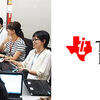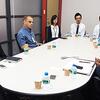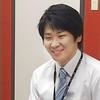Texas Instruments (TI) is a global semiconductor design & manufacturing company. At TI, TUJ interns have found internship opportunities in the Finance, Purchasing and Sales Operations departments.

Company Profile
Company Name: Texas Instruments Japan
Industry: Semiconductors
No. Employee: Approximately 1,200
Website: http://www.tij.co.jp JapaneseNew Tab
Texas Instruments: Gavin Reid (GR), Controller
Yuko Nuki (YN), Manager, Marketing Pricing
TUJ Interviewer: William Swinton (WS), Director, International Business Program
GR: I've been at Texas Instruments (TI) for 18 years now. I've worked in the U.S., Europe, India, and, prior to coming to Japan, I was in the Philippines. A lot of the universities there have very strong internship programs. So I got used to having people come through the team every six months. It was really good because we could see what talent is coming out of the university and compare it to the current staff. It gave us more opportunities to both develop the team, and also, to develop the students. I thought it was very good, but we didn't have anything when I came to Japan. I met a professor from Temple University at a business seminar, who talked with me about internships. And that is how we started.
We were pretty happy with the interviews with the TUJ students. From the professionalism of the application to the way they conducted themselves, it was very good.
I'll give a comparison. The year before, we were recruiting for a new college graduate, and, I'll be frank, we didn’t find the right candidate so we didn't take anyone. That is why I value internships. At Texas Instruments, identifying and getting talent out of colleges is key and critical, and it's something, not just TI Japan, but TI worldwide thinks is extremely important.
GR: I'm looking for a very motivated individual, someone who is competent, and someone who has got an eagerness to grow. The academic background is important, but having the capacity to learn is more important to what they'll actually do in the role. So that's really what I'm looking at. In addition, I look at their character, as well as their abilities to work in a team environment and to communicate with other colleagues.

"I'm looking for a very motivated individual, someone who is competent, and someone who has got an eagerness to grow. The academic background is important, but having the capacity to learn is more important"
GR: Sometimes in Japan, when you're interviewing, it's extremely formal. I try to make it informal to see their poise and posture. I try to see if they really listen and read into the question and give a sincere answer. I ask not only about what they've learned in college and what they want to do in their career, but about experiences in their lives, whether family-related, sports, or clubs. I try to see if they have a teaming mentality, if they have a good work ethic, how they manage stressful situations, how they manage time, and how they prioritize.
GR: When I came to Japan, communication was an opportunity for improvement. Things have been done the Japanese way, but we're a multinational company. To increase the level of communication, speaking in English is important, and that's where I believe having bilingual interns can help. In addition, when I talk with the management team that comes over, I look at whether people can express their thoughts and answer questions in English. I ask myself if the leadership team leave here saying, “yes, Japan employees are doing things correctly, the TI way, with ethics and values being forefront.” So that's what I was driving at. One of your interns, Nakada-san, participated last August. He got to be in the same meeting as the CFO of TI and the finance leadership team. So it's good exposure for your students as well.
YN: Definitely, in a positive way. Last year, we had Nakada-san, and that was the very first time for TI Japan to have an intern in the organization. I was a little bit skeptical about how it can be a win-win situation. We can provide a good experience to the intern, but at the same time, we want them to contribute professionally because we would spend a lot of resources to train them.
In the end, it turned out to be very good. We had some accomplishments for some particular projects because of Nakada-san's contribution. Throughout the project, I saw a very good influence on my team members through their interactions with Nakada-san mainly because of his positive attitude to learn new things. For example, when there was a case where he encountered some system issue, instead of asking us right away, he went on the internet, researched similar issues, and found the solution by himself in a way that we didn't think of. That was impressive to everyone on my team because it is a challenge that anyone can encounter. He demonstrated a very good way to resolve this issue. We all learned from him, actually.
Many members of my team have more than 25 years of experience. It's good that we have senior, experienced people, but we need more new perspectives in the team. And having interns like Nakada-san and Yamazaki-san, who joined us this term, has been a very good mixture to diversify the team.
GR: I agree 100%. It's bringing that fresh perspective that is invaluable. We have a very senior organization, so bringing a perspective that says "I've got energy. I want to learn." is important. Having the freedom to challenge or question things, even the established processes, is important to an organization. Having fresh eyes is important, but the key thing is empowering them to express their opinions. I like to think we do have an open environment at TI.

"It's bringing that fresh perspective that is invaluable. We have a very senior organization, so bringing a perspective that says "I've got energy. I want to learn." is important."
YN: When we talk about projects, it's really about timing. It is fortunate that we had a project that we could get the internship student to be involved in both last year and this year. That's very exciting, but I think even without a project, we will be able to provide an experience that actually gets into the day-to-day work execution. For example, we are in the pricing group and both Yamazaki-san and Nakada-san are already interacting with external partners, such as distribution and field sales teams, to respond to requests. That involves their communication skills as well as their thought processes and knowing how to use the tools, how to come up with a good pricing. It seems to be very helpful to them to actually learn and do it, rather than just observing and shadowing.
YN: It would be important to know what tasks you can assign during the period of time that is given. For my case, when I learned that it would be three months, I planned their assignments ahead of time. You have to plan for the training period; you have to plan for the resources to train the intern and who handles that. That kind of planning is very important because it requires cooperation and collaboration in the team. If you can make it work, I am sure you will get a good result, which is what happened with my team.
You don't want to just throw your interns onto the team and have no one take care of them. Or, if you ask someone to train an intern all of a sudden without any back up plan, then it will be a bad result for the business and also for people's morale. So, in that sense, it would be safer for the intern to work on a sizable team, instead of with only one or two people, in order to make it successful and win-win. But, as long as you can plan it ahead of time, I'm very confident internship programs can be very successful.
GR: One of the things we are looking for when we bring someone in is their awareness of different cultures. And what Temple University provides to TI, in my mind, is the diversity, through your curriculum, and through your student body. An intern coming in with the background of a U.S.-driven curriculum, as well as some Japanese social understanding, gives us strength. I need diversity in my teams here so that we can grow as an organization. And Temple University is a great avenue for us to succeed. Diversity is critical. It's the only way forward.
Interview date: Wednesday, July 16, 2014

Read Stories Of Students Who Interned Here
I recommend this [TI] internship to students as the working environment is very global, where one actually performs tasks such as interacting with different overseas offices and HQ. You also get trained in different departments and get to visit other TI Japan sites.

Read Stories Of Students Who Interned Here
TIJ will give you many opportunities and support when you need it. It is not only about a job but also about your career. I especially recommend women to intern at TIJ as they have great gender equality. I believe TIJ is one of the best places to learn correct business manners and the importance of the working environment.

Read Stories Of Students Who Interned Here
TI values their internship program and provides many training opportunities for interns to make sure that both the company and the intern benefit from the experience. They also have a very good working environment, and you can easily talk to anyone when you need help.



